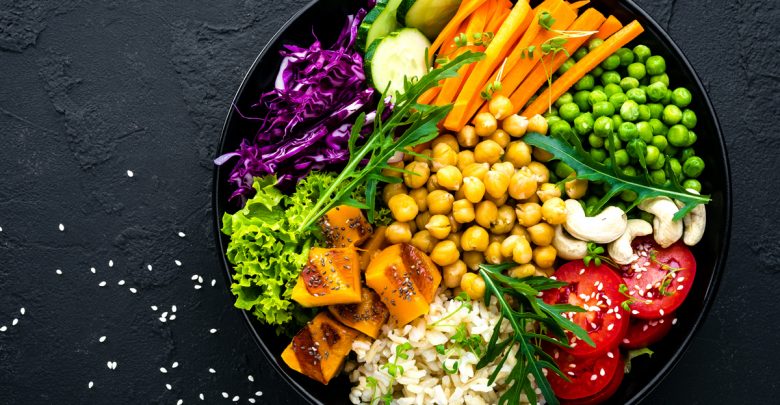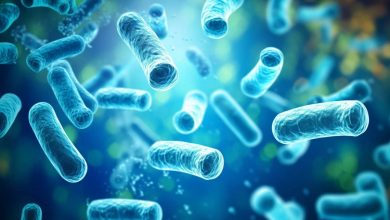
Vegan and vegetarian diets may increase stroke risk, experts say
دراسة: التقيد بالحمية النباتية يهدد أصحابه بالسكتة الدماغية
Vegan and vegetarian diets are linked to a lower risk of heart disease but may increase the risk of stroke, experts say.
A study from the University of Oxford found that people who follow the diets have a 22% lower risk of heart disease than meat eaters, while those who eat fish but no meat (pescatarian diet) have a 13% reduced risk.
However, researchers found that vegetarians and vegans were a fifth more likely to suffer a stroke than meat eaters, which they suggest may be partly due to a lack of vitamins.
The study, published in the British Medical Journal (BMJ), included data for 48,188 people with no history of heart disease or stroke at the start of the study.
The group was split into meat-eaters (24,428 people), fish-eaters(who consumed fish but no meat (7,506 people), and vegetarians and vegans (16,254 people).
Vegetarian and vegan diets have become increasingly popular in recent years, partly due to perceived health benefits, as well as concerns about the environment and animal welfare.
Researchers
Over a follow-up of 18 years, 2,820 cases of ischaemic heart disease and 1,072 cases of stroke were recorded among the overall group.
After adjusting for factors that might influence the results, researchers found that fish eaters had a 13% reduced risk of heart disease than meat eaters, while vegetarians and vegans had a 22% lower risk.
This was equivalent to 10 fewer cases of ischaemic heart disease in vegetarians and vegans than in meat eaters per 1,000 people over 10 years.
The researchers said: “We observed lower rates of ischaemic heart disease in fish eaters and vegetarians than in meat eaters, which appears to be at least partly due to lower body mass index and lower rates of high blood pressure, high blood cholesterol, diabetes associated with these diets.”
But the study found 20% higher rates of stroke in vegetarians and vegans than in meat eaters, equivalent to three more cases of stroke per 1,000 people over 10 years.
This was mostly due to a higher rate of haemorrhagic stroke – the type caused by bleeding in or around the brain.
The team said the increased risk of stroke could be down to lower levels of vitamins among the vegetarians and vegans in the study.
They said further investigation was needed, adding: “Vegetarians and vegans (in the study) have lower circulating levels of several nutrients (eg, vitamin B12, vitamin D, essential amino acids, and long chain n-3 polyunsaturated fatty acids), and differences in some of these nutritional factors could contribute to the observed associations.”
Researchers also suggested that low blood levels of total cholesterol among vegetarians and vegans may play a role.
They added: “Vegetarian and vegan diets have become increasingly popular in recent years, partly due to perceived health benefits, as well as concerns about the environment and animal welfare.
“In the United Kingdom, both the representative National Diet and Nutrition Survey 2008-12 and a 2016 Ipsos MORI survey estimated about 1.7 million vegetarians and vegans living in the country.”
Tracy Parker, senior dietitian at the British Heart Foundation, said: “This study provides further evidence that eating more plant-based foods can help lower our risk of heart disease.
“However, it also found that vegetarians, including vegans, are at a higher risk of stroke than meat eaters – potentially due to lack of certain nutrients.
“Whilst this is an interesting finding, this study is observational and doesn’t provide us with enough evidence, so more research in this area would be needed.
“Whether you’re a committed carnivore, a veggie, or a vegan, one way to reduce your risk of heart and circulatory diseases is to ensure you’re eating a balanced diet, packed with plenty of fruit and vegetables, wholegrains, beans, lentils, nuts and seeds. For those who do eat meat, cutting back to less than 90g of red or processed meat a day is advised.”
source: bournemouthecho.co.uk
توصلت دراسة حديثة إلى أن النباتيين أكثر عرضة للسكتة الدماغية ممن يتناولون حمية غذائية تحتوي على اللحوم.
ويعتقد العلماء بجامعة أكسفورد، الذين تابعوا لمدة 18 عاما، نحو 50 ألف مشارك بمتوسط عمر يبلغ 45 سنة، أن تناول كميات قليلة من الفيتامينات المتأتية من اللحوم قد يسبب هذا الخطر.
ووجد العلماء أن النباتيين لديهم خطر الإصابة بالسكتة الدماغية بنسبة 20% أكثر من الذين يتناولون اللحوم، وهذا يعادل 3 حالات من السكتة الدماغية لكل 1000 شخص على مدى 10 سنوات، ويعزا ذلك بشكل رئيسي إلى ارتفاع معدل السكتة الدماغية النزفية، التي تحدث عندما تتسرب الأوعية الدموية في الدماغ أو تتمزق.
وقال العلماء إن النباتيين الذين شاركوا في الدراسة، سجلوا انخفاضا في نسبة الكولسترول في الدم وانخفاضا في مستويات الفيتامينات الرئيسية مثل فيتامين “بي 12” الذي يمكن أن يفسر هذه الصلة بين الحمية الغذائية النباتية والإصابة بالسكتة الدماغية.
وأشار العلماء إلى أنه: “بشكل عام، أظهرت الدراسة الحالية أن البالغين في المملكة المتحدة الذين كانوا يتناولون الأسماك أو النباتيين، لديهم مخاطر أقل للإصابة بأمراض نقص تروية القلب مقارنة بمن يأكلون اللحوم، لكن النباتيين كانوا أكثر عرضة للإصابة بالسكتة الدماغية”.
ووجد العلماء أن النباتيين أقل عرضة بنسبة 22% للإصابة بأمراض القلب، من الذين يتناولون اللحوم، أي ما يعادل 10 حالات إصابة لكل 1000 شخص، على مدى عقد.
أما أولئك الذي يتجنبون اللحوم ويتناولون الأسماك بدلا عنها، فكان خطر الإصابة لديهم بالسكتة الدماغية بنسبة 13%.
وقال العلماء إن هذا الاختلاف ربما يرجع جزئيا، على الأقل، إلى انخفاض وزن الجسم وضغط الدم ومستوى السكري في الدم بين النباتيين.
وقال الباحث البارز الدكتور تامي تونغ، من قسم الصحة السكانية في نوفيلد في أوكسفورد: “هناك حاجة إلى إجراء دراسات إضافية في مجموعات كبيرة أخرى ذات نسبة عالية من الأشخاص الذين لا يتناولون اللحوم للتأكد من قابلية تعميم هذه النتائج”.



